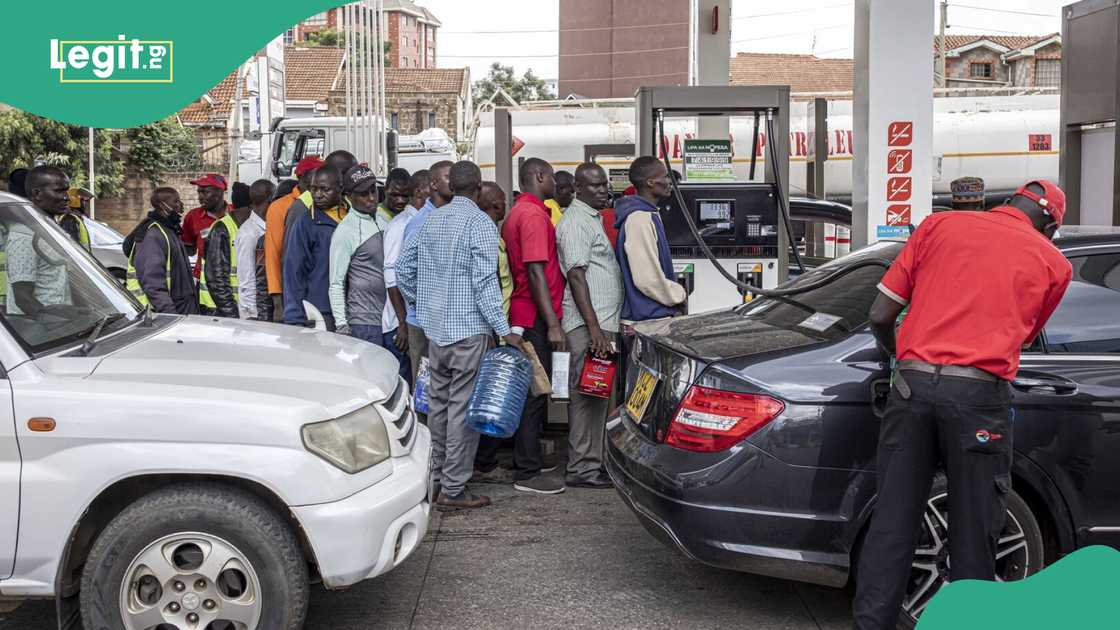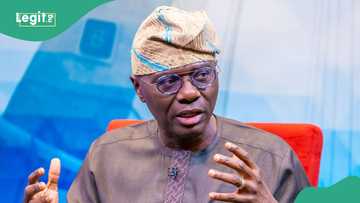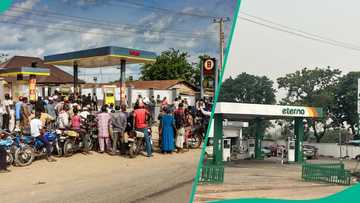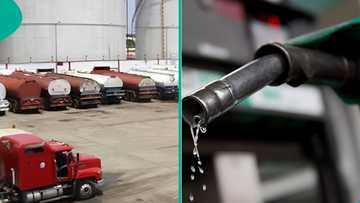Anxiety for Nigerians as Depot Owners Hike Petrol Prices to N889 Per Litre
- Nigerians are apprehensive over the increase on petrol prices at the depots across the country
- Recent findings show that petrol prices have risen to N889 per litre in Lagos, Calabar and other depots nationwide
- The new rate, which marks a steady rise from ₦887 per litre last week, has sparked growing frustration among motorists and economic analysts
Pascal Oparada is a journalist with Legit.ng, covering technology, energy, stocks, investment, and the economy for over a decade.
Anxiety is spreading across Nigeria as the depot price of petrol surged to ₦889 per litre, deepening fears of another round of hardship for citizens and businesses.
The new rate, which marks a steady rise from ₦887 per litre last week, has sparked growing frustration among motorists and economic analysts.

Source: UGC
Countdown to ₦1,000 per litre
Matrix Energy reportedly sold the product at the highest rate of ₦889 per litre, while Aiteo offered the lowest at ₦871.
Other major operators, including Dangote Petroleum Refinery, Eterna, AA Rano, and AYM Ashafa, sold between ₦874 and ₦885, according to depot data obtained by Vanguard.
Industry operators have warned that petrol could soon cross the ₦1,000 mark once the Federal Government’s newly approved 15 percent import duty on petrol and diesel takes effect later this month.
The policy, slated to begin after a 30-day transition ending on November 21, 2025, is intended to stabilize the downstream market and protect local refineries.
However, Nigerians are bracing for the worst. Transport operators, manufacturers, and small business owners fear the ripple effect on the cost of goods and services could be catastrophic.
For many, this is a grim reminder of the post-subsidy struggles that continue to push households to the edge.
Depot owners defend new policy
In a phone interview, Dr. Billy Gillis-Harry, National President of the Petroleum Retail Outlets Owners Association of Nigeria (PETROAN), expressed cautious optimism.
He said members of his association would support the government’s implementation of the tax, provided it is done fairly and without jeopardizing small businesses.
“This is a new measure that has not been implemented before,” he said. “From all indications, the government has good intentions, so our association would work with others to implement it responsibly.”
The Federal Government insists the new tariff is not revenue-driven but designed to correct market distortions that threaten the country’s refining recovery.
Officials argue the tax will “reinforce national energy security, safeguard local refining capacity, and ensure fair competition.”
Government justifies the tax move
According to the government’s statement, domestic refining has begun to expand, especially in diesel, but price instability remains due to misalignment between local refiners and marketers.
Import parity, which dictates pump prices, often undercuts the recovery costs of local producers, especially when the naira fluctuates or freight costs rise.
“Left unchecked, these risks undermine our nascent refining sector at the very point of recovery,” the statement read.
“Our responsibility is twofold, to protect consumers and producers from unfair pricing while creating a level playing field for investment.”
Tinubu’s directive and what lies ahead
President Bola Ahmed Tinubu has already approved the 15% import duty on petrol and diesel, directing that payments be made into a designated Federal Government account verified by the Nigerian Midstream and Downstream Petroleum Regulatory Authority (NMDPRA).
He also ordered the Nigeria Customs Service (NCS) and NMDPRA to enforce the duty after the transition period, and to prioritize locally refined fuel before issuing import licenses.

Source: Twitter
A periodic review of the tariff has also been mandated to assess its necessity as domestic capacity grows.
For now, Nigerians can only wait, watching fuel prices inch closer to ₦1,000 per litre, with a mix of fear, fatigue, and fading hope.
Meet Nigeria’s top 10 petroleum depot owners
Legit.ng earlier reported that while Dangote Refinery dominates headlines, the real lifeline of Nigeria’s petroleum supply often rests in the hands of independent depot owners.
These players store, distribute, and move millions of litres of fuel daily, ensuring petrol stations and the economy keep running.

Read also
Sanwo-Olu shares ₦2.7bn to 10,000 Lagos households as FG expands ₦75,000 cash transfer nationwide
From Lagos harbours to Calabar Free Trade Zones, they compete fiercely for market share, influence, and strategic advantage.
Source: Legit.ng





